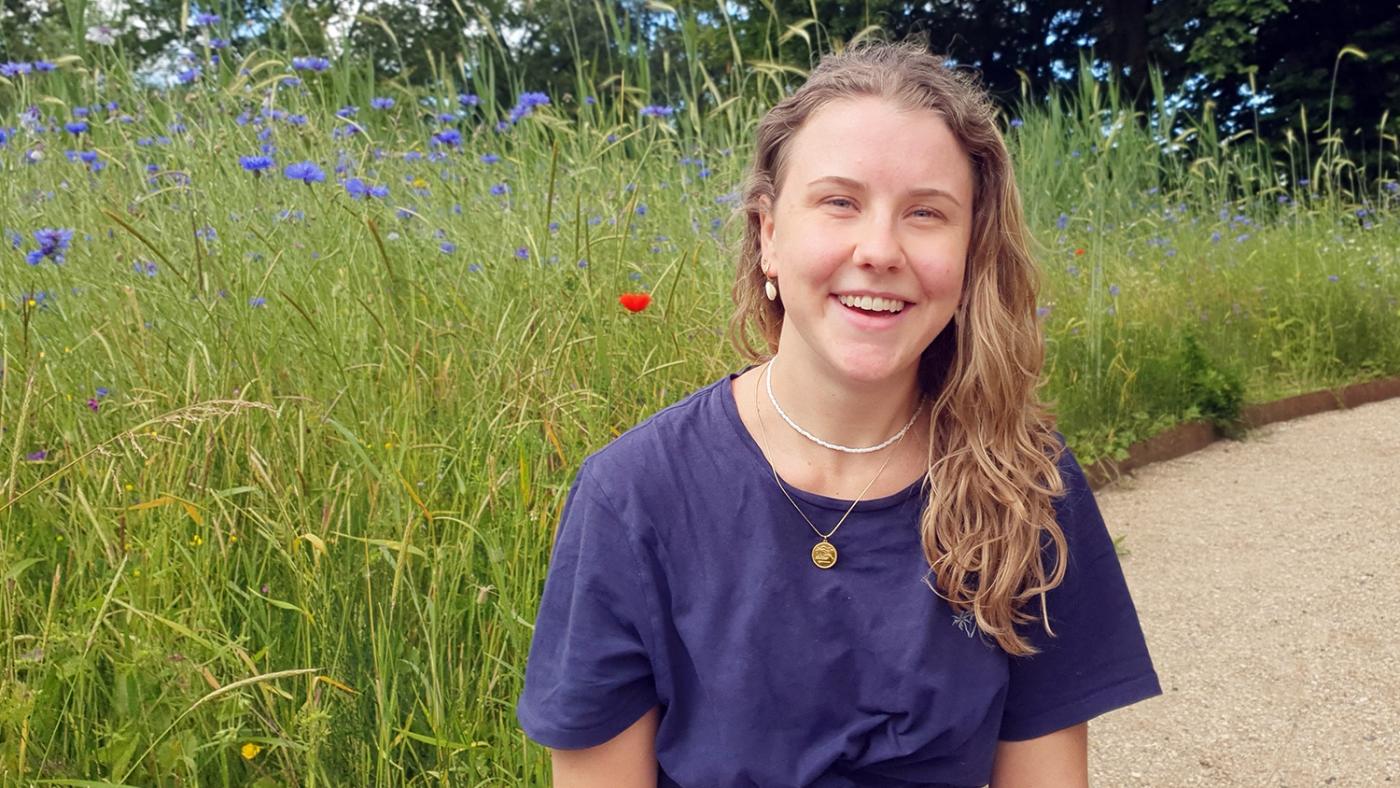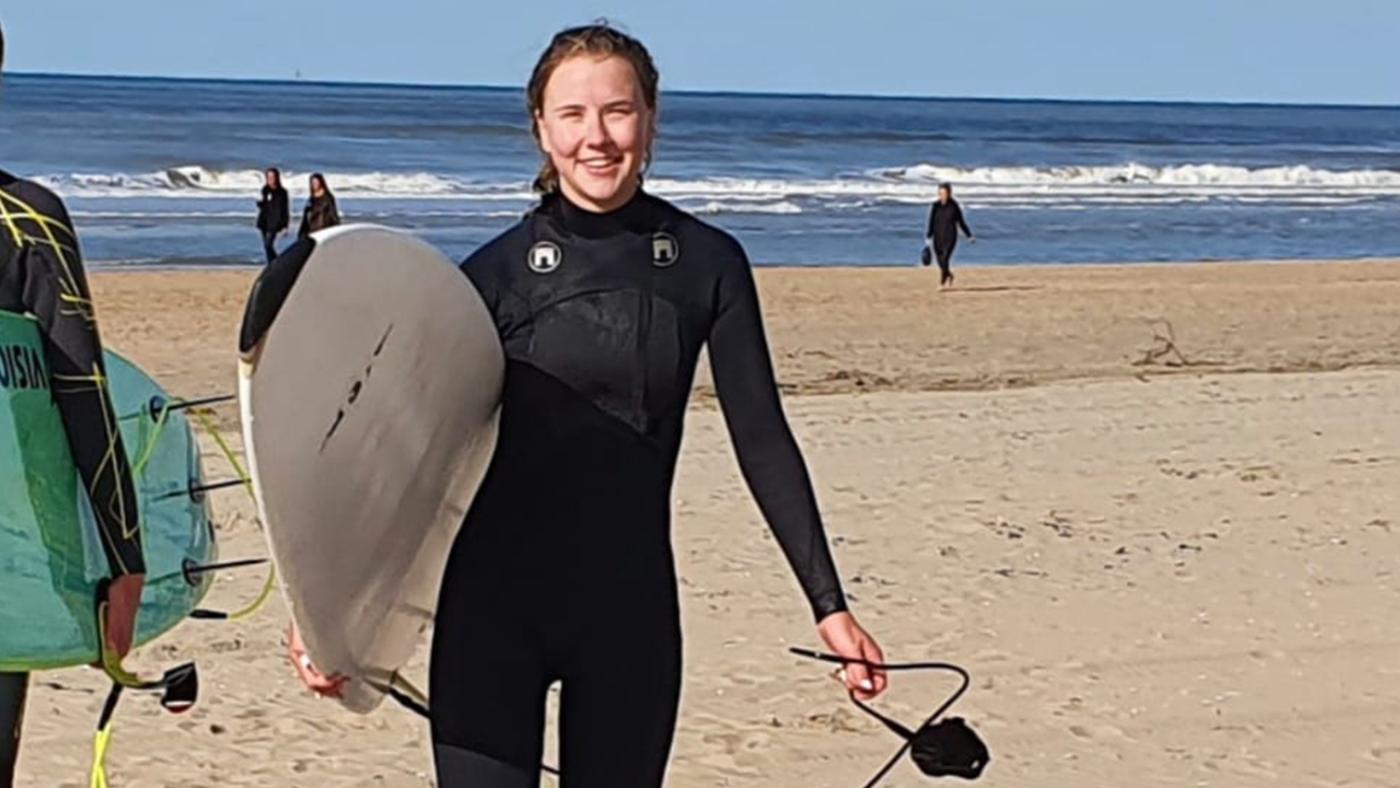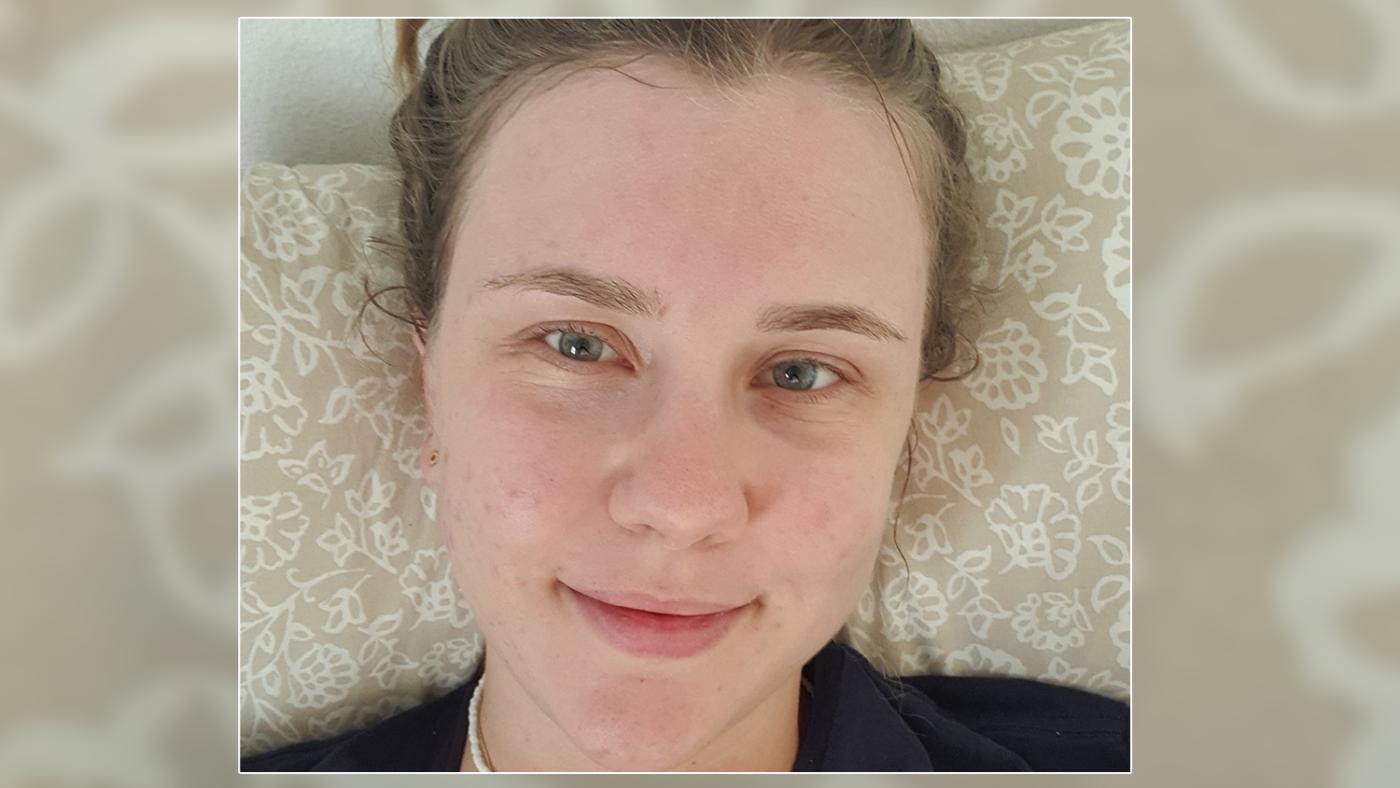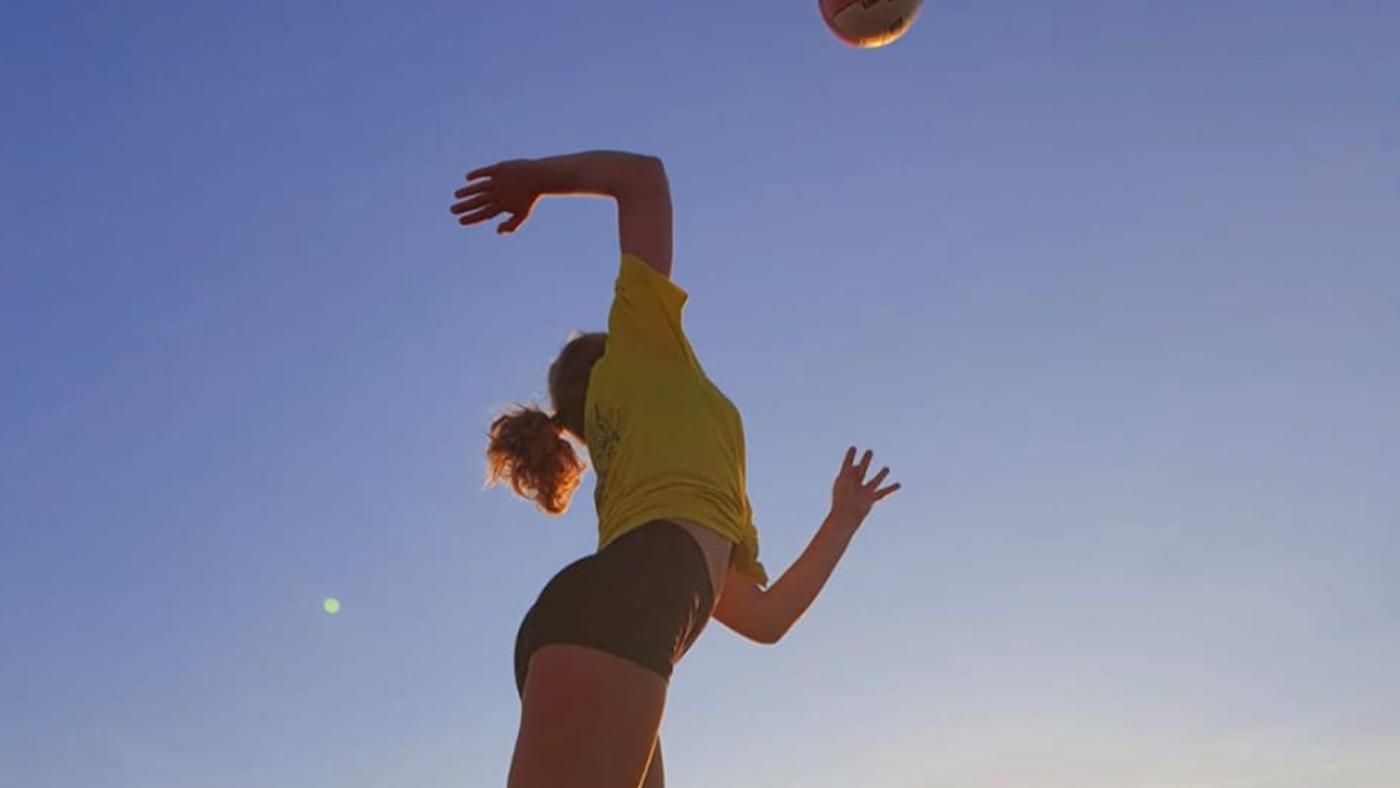Long Covid put an end to Sanne’s studies
Once a UU student, now 'retired' because of Covid

Shortly before the summer, I talked to Sanne in her student room in Zeist. Before Covid, she used to play volleyball three to four times a week and dedicate her summers to windsurfing and beach volleyball. She also worked 40 to 50 hours a week at a beach café in Noordwijk, where she grew up. She had a busy social life with plenty of parties and outings with friends.
That image is a stark contrast compared to the Sanne sitting opposite me. Although she’s slowly starting to feel better, I immediately notice how her energy level is. Sometimes, she loses her train of thought and I have to help her get back on track. She says she now leads "a pensioner’s life" because she can spend up to 16 hours a day in bed. “I’ve been rewatching The Office for the umpteenth time because starting a new series is too much for me."
I ignored the real cause
She contracted Covid for the first time at the beginning of 2022 when the university was slowly starting to minister classes on campus again. The 1,5-metre rule was still in effect, but the most drastic measures were being relaxed.
Later that year, in the Autumn, the Netherlands was fully "open" once again. That's when she got her second infection. Sanne was in the final stages of her Master’s degree, doing an internship at Auris. It turned out to be the final push.
“I only started to call myself 'sick' now that I’m feeling a little better because I notice now how poorly I was at the time. I wasn’t doing great after the first infection. I got tired and overstimulated quickly, and I was constantly injured. But I assumed it had some other cause. I then sent my volleyball team a message saying I was having trouble processing all the stimuli now that everything was reopening, but that made me ignore the true cause, and my second infection was the final blow. After that, even grocery shopping was too much.”
After the second infection, Sanne stayed in her room in Zeist most of the time. Travelling to see her parents was too much, so her boyfriend took care of her. “I don’t know if I would have made it through that phase without him,” she says, emotions pouring through her voice.

Not flexible
Despite all the symptoms, she still wanted to complete her studies in Orthopedagogics. Her internship was flexible, allowing her to work fewer hours a day, which meant it would take longer for her to finish the internship, but at least she would be working enough hours to graduate. However, the university was not willing to accept that.
“In my view, my study programme wasn’t flexible and that's a shame. The organisation and I wanted to find a solution, but the programme would not make any exceptions. I absolutely had to work a certain number of hours in one year. Despite my issues, I was not allowed to stretch those hours out over a longer period. They did this even though the programme projects this image of wanting to be an accommodating place where everyone is happy and can graduate," she recollects, visibly emotional.
Getting better, slowly but surely
Luckily, many friends stayed by her side. She didn't lose many friends due to her sickness. She’s "very happy" about this: "Everyone accepted my cancellations and were so sweet when I couldn’t muster up the energy to stop by.” She knows things could have been different. Through Facebook, she got in touch with a group of other women suffering from Long Covid. Many of the patients around Sanne's age shared that they were struggling socially, having lost friends.
Sanne found the group when she started searching on YouTube and Facebook for ways to get better. The physical therapy and occupational therapy her GP had sent her to weren’t helping enough. “I went to physical therapy twice a week for half an hour, even when I was tired. I’d cross my boundaries there, something I now know isn’t smart. But there was so much that was still unknown about Long Covid at the time.”
Psychological did help a lot, even though some negative thoughts still swirl around in her head sometimes. Her answers to DUB's questions often include questions that start with "what if". The therapist helped her accept the disease and realise that “what if” questions are actually pointless. She also felt good sharing her own story. Now, when she’s having a bad day, she tries to “accept that life is shit right now. And then I think: this too shall pass' and proceed to only do the things I want to do,” she says, laughing.
She’s currently trying the mind-body method to feel better. “I’m trying to reprogramme my brain because that’s something I can influence,” Sanne explains. “Physically, you’re illogically unstable. There’s no pattern to why I feel good or bad, so it’s harder to work on that.”
She supplements this method with microdosing – ingesting small amounts of psychedelic mushrooms, a tip from her mother-in-law. “I didn’t want to try it at first, but the documentary ‘Fantastic Fungi’ convinced me. At a certain point, you just start to think: ‘If it can help, why not?’ It increases my brain capacity, making the mind-body method more effective. It’s one of the puzzle pieces I use in my treatment.”

I miss the time when I could just have a drink and dance without a care
The methods Sanne found on her own have pulled her out of the dark. She’s even developed a positive mindset for the future: “When I was at my lowest, the feeling was more ‘I hope things will be okay’, but now I truly believe they will be.”
She tries to keep a steady schedule by getting up at 9:30 am every day. She still takes a nap in the afternoon and often doesn’t get out of bed before dinner. These days, she’s cooking for herself, but she’s always got an emergency meal in the freezer in case she doesn't feel good enough to cook. After dinner, she usually goes back to bed, but sometimes she manages to do something creative, like drawing, puzzles, or making bracelets.
There isn’t much left of her social life. “I can go to parties, but then I have to start preparing three days in advance and I’ll feel the effects of it for at least two days afterwards,” she explains. “I can manage to go watch my volleyball team's games, but that takes a day of preparation and a day of recovery too.”
Not being able to have a "normal" student life is “one of the most frustrating things” for Sanne. "This should be one of the most carefree and social times of my life, but it turned out to be the opposite. I still struggle with that, especially considering I live in a building with many student homes, so I often hear other people having a party. Or I'll listen to my friends talk about how much fun they had at Carnival, for example. That's when I miss the time when I could just have a drink and dance without a care.”

Dot on the horizon
She’s since started a part-time study programme at the Utrecht University of Applied Sciences (HU) to become a sign language teacher. She goes to class twice a week for a few hours. She gets all the help she needs at HU: “They don’t mind if I leave the class before it ends. I can also do a lot of things at my own pace.”
It’s a surprisingly good match, she says: “It’s a happy accident. I started doing it because my mother is hard of hearing and, in my internship, I worked with people who had hearing loss as well. In the end, it’s great that I ended up here.”
She will probably never finish her Master’s because she’s “kind of done with studying at the university level, but never say never.” She wants to see if she can combine her knowledge of Orthopedagogics with sign language, but, for now, she doesn’t want to commit to anything too strictly: "When you're sick, you get a different idea about what matters.”
Now, Sanne is doing much better. DUB talked to her on the phone after the summer break and learned that her health has improved significantly. She has fewer symptoms, more energy and seems to be recovering faster. As a result, she hasn't been spending as much time in bed anymore. Little by little, she is emerging from her retirement.
Sanne is not alone
There are ten known cases of students who dropped out of UU due to Long Covid or post-Covid issues. Another 245 students filled in "Covid" or "pandemic" as their reason for dropping out, without further explanation. This information was collected on Studielink, where students can reveal their reasons for dropping out. They are not obliged to do so.